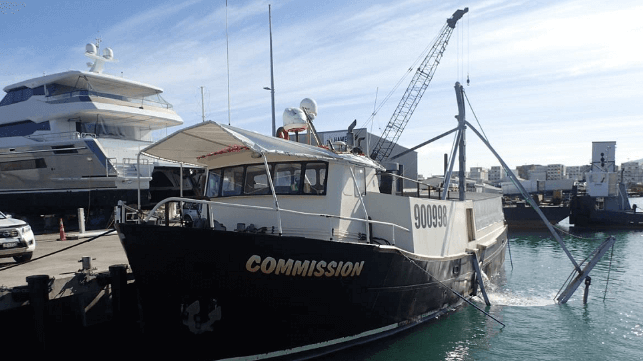Fishing Vessel's Skipper Fined for Leaving Wheelhouse Before Collision

The captain of a New Zealand fishing vessel has been fined for leaving his wheelhouse unattended and colliding with a container ship in the Bay of Plenty last year.
Mike Te Pou was the captain of the 60=foot fishing vessel Commission on July 28, 2021, when it collided with the Panamax container ship Kota Lembah. The fishing vessel was motoring at about six knots and laying out a longline in the Bay of Plenty, and Te Pou - the only qualified watchstander on board - spotted the boxship on radar at 0315. Not understanding the risk of collision, he left the wheelhouse to help out his deckhands with the fishing gear. Meanwhile, the Commission approached the Kota Lembah, which was adrift with engine off while waiting for a berth at Auckland. The two vessels collided at 0355.
Following the collision, the container ship suffered scraping along its hull near the bow, while the fishing vessel suffered damage to its stabilizer arm and wheelhouse. The hull of neither vessel was breached in the collision and no injuries were reported.
This week, a district court found that Te Pou was guilty of operating a ship in a manner which caused unnecessary danger or risk and fined him NZ$1650.

that matters most
Get the latest maritime news delivered to your inbox daily.
"[Te Pou] remained away from the wheelhouse for 40 minutes. Didn’t check on the location of the Kota Lembah and at 3.55 am the two vessels collided. This was a collision a long way off the coast of New Zealand, amd was completely avoidable," said Pete Dwen, investigations manager at Maritime New Zealand. "We have prosecuted numerous cases this year for watchkeeping failures, and it is frustrating we are continuing to see these incidents arise."
New Zealand's Transport Accident Investigation Commission (TAIC) reached a slightly different conclusion on fault in a report released earlier this year. Though Te Pou failed to keep a proper lookout, his fishing vessel had right of way, TAIC found. The agency determined that because Kota Lembah had turned her engines off voluntarily, she was still a power-driven vessel under COLREGS. Since Commission was fishing, this means that Kota Lembah was necessarily the give-way vessel - and was therefore required to take action to avoid a collision.
